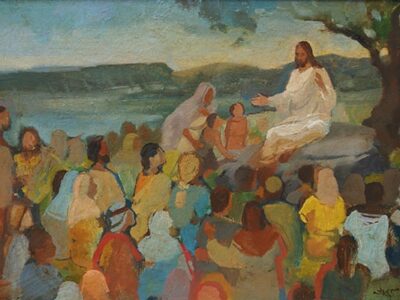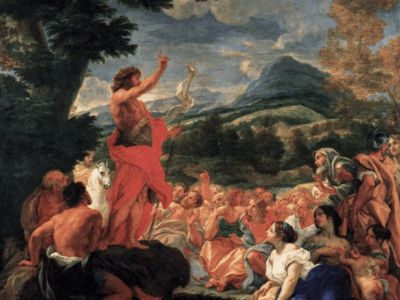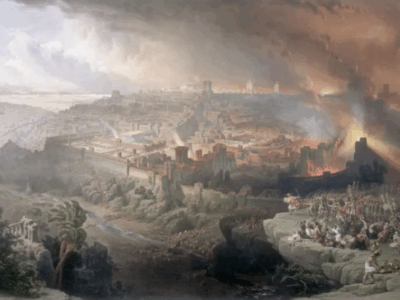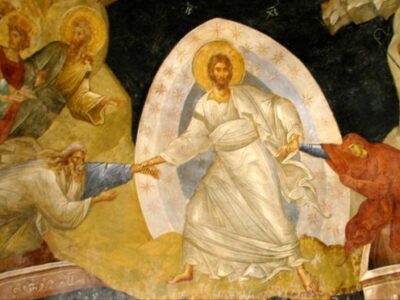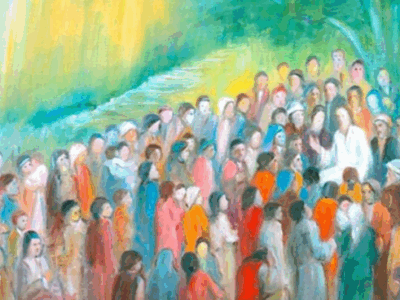Nothing is Something
Year C
Acts 1:1-11
Psalm 47
Ephesians 1:15-23
Luke 24:44-53
May the words of my mouth O God… speak your truth…
Ascension Day was three days ago… but we commemorate it today because it may just be more important than we realize… and to use some artistic language… it has to do with positive space… and negative space…
And drawing from an article [ no pun intended ] by Daniel Drage in Image magazine… we’re reminded that in Genesis… the sacred is fashioned not only by empty and defined space… but also by time… that God’s creative activities end on the seventh day… when God rests… and in doing so creates the first Sabbath… itself a type of negative space… ] we remember that Adam and Eve… hid themselves from the presence of God among the trees of the garden… but God called to the man and asked… Where are you?… a theme of absence and presence that will occupy much of the Jewish scriptures as God pursues humanity… and when the man and woman are driven from their home in the garden… the equation is reversed… and humanity is left to search for God… sometimes in negative spaces… like from the cleft in the rock where Moses hid… when this preeminent spiritual leader was granted a vision in only negative form… the back side of the Divine…
In Matthew’s Gospel… there is silence about Jesus’ ascension… the original ending of Mark’s Gospel included nothing about it… a negative space of sorts in itself… that had to wait almost two hundred years to be filled by the last two verses of that Gospel… and Luke… who is also known to be the author of Acts… tells two different versions of the Ascension…
In today’s Gospel… the Ascension happens on Easter day… just a few vv. before… Jesus appeared to the two on the Emmaus Road… and was known to them in the breaking of the bread… was known to them in the space created when he was no longer there… and in today’s reading from Acts… the resurrected Jesus remains with the disciples for forty days… and speaks about the Kingdom of Heaven… and tells them that they will receive power from on high… and only after he had said this… forty days after the resurrection… did he ascend… forty days…
Gail Ramshaw… a former professor of religion at LaSalle University… who writes on liturgical language… reminds us that for a people whose lives were determined and measured by heavenly cycles… particularly the 29.5 days between full moons… that forty is longer… it exceeds the familiar and measured lunar cycle… and so things happen for a long time… let’s call it forty days that it rained on Noah’s ark… it’s forty days that Nineveh is threatened with destruction… and that Jesus is tempted after his baptism… at age forty Moses kills an Egyptian taskmaster… forty years later he meets with God on Mount Sinai… for forty years Israel wanders in the desert… and forty years later Moses dies… and Saul… David… and Solomon each reign forty years… a long time…
So did the Ascension happen on Easter Day… or was it forty days later… is one story right and the other one wrong… were our Jewish-Christian ancestors… telling literal stories… or symbolic stories that we now take literally… ] on our church calendar at least… the Book of Acts wins the day above the Gospel of Luke… because there are forty days from Easter Day to Ascension Day…
But if we have enshrined in time… what really exists out of time… then we have also enshrined it in space… that is… in three dimensions… because the language in Acts and in Luke conveys action and direction… lifted up… gazing up… looking up… taken up… carried up… so in which direction is the Heaven to which Jesus went… and how does the answer take into account that the Earth is round… ] is Heaven place… or is it perhaps really a quality of presence…
Perhaps Luke delays the Ascension in Acts… because he knew not only of the power of community… but he knew that it can take a long time for lasting change to take hold… for the neural pathways in our brains to be re-wired… and if forty days is how long we must wait for God’s intent to be realized… and we rush it… then maybe we’re really not changed at all…
Obfuscation… reversal… and negation… these are the paradoxical modes of engaging a God who prefers to be present through absence… it’s no wonder then… that when the Israelites seek to create a resting space for God… whether in the Tabernacle or eventually in the Temple… God determines for them what must be left open… empty… and undisturbed… since God’s presence will rest… as described in Exodus 25… above the mercy seat… from between the two cherubim that are on the ark of the covenant… in other words… God meets the chosen people… only in negative space…
And even in the Gospels… which tell the story of God enfleshed… negative space remains… from the vacant tomb… to the punctures in the hands and feet of the embodied God… signals of emptiness remain… and like sculptures… the sacred stories tell of openings framed by closures… matter embracing the immaterial… and absence meeting presence… in relational fullness…
And in his Ascension… Jesus too creates negative space… as our Prayer of the Day says… he ascended so that he might fill all things… and so that the disciples might be clothed with power from on high… but it’s not just them… it’s all of us now too… and I think fifth-century Pope Leo came very close to a paradoxical truth… when he said that Christ ascended into the sacraments… the outward and visible sign of an inward and spiritual grace… and in baptism… in the waters of baptism… our sins are forgiven us… in the waters of baptism… the public profession of our faith that we make… unites and integrates us with something far bigger than we realize or can imagine… and we can reject the lie in which we expect ourselves and each other to be more than human… and what I hope we remember from today’s Gospel… is that as Jesus was taken up… he didn’t pray for the disciples… he blessed them… so he must bless us as well…

